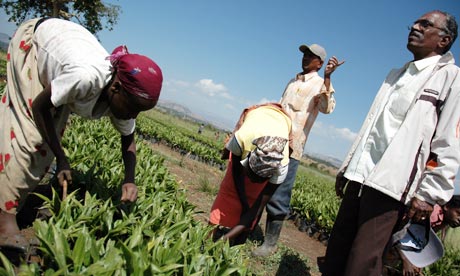Ethiopia needs Allana PotashEthiopia is truly coming of age…1 million hectares at a time…60m hectares of domestic agricultural land is going to grow a lot of cereals…wonder who is going to provide the fertilizer for 60m hectares…think it might be Potash Corp.? ….hmmmm it is no wonder why the Potash Basin in Ethiopia has so much support from the government..we appear to be part of the master plan for Ethiopia…time will tell. Mayber someone can post how many tons of potash will be required for 60m hectares per year….?
“Ethiopia has vast reserves of underused land – 60m hectares of the country's 74m hectares suitable for agriculture is not cultivated. By 2013, 3m hectares of idle land is expected to have been allotted – equivalent to more than one fifth of the current land under cultivation in the country.”
Ethiopia – country of the silver sickle – offers land dirt cheap to farming giants
Addis Ababa sells vast fertile swaths to international companies in effort to introduce large-scale commercial agriculture.

West in Gambella, Karuturi Global, the listed Indian horticulture company that employs Rao, is bringing in 1,000 new tractors to work the 300,000 hectares it has leased – making it one of the biggest farms in the Horn of Africa, if not the continent. "It is 120 kilometres [75 miles] wide," Rao said proudly. "Three hours to cross by Jeep."
Ethiopia's great land lease project is moved swiftly ahead. In an effort to introduce large-scale commercial farming to the country, the government is offering up vast chunks of fertile farmland to local and foreign investors at almost giveaway rates. By 2013, 3m hectares of idle land is expected to have been allotted – equivalent to more than one fifth of the current land under cultivation in the country.
The move is part of a wider trend that has seen other African and Asian countries seek to take advantage of high global demand and the cost of crops by offering agricultural land to foreign companies, private equity funds and governments, particularly those of import-dependent Gulf countries.
In a food-insecure country such as Ethiopia, where several million people rely on food aid, the idea of offering fertile land to outsiders has raised concerns. But government officials point out that Ethiopia has vast reserves of underused land – 60m hectares of the country's 74m hectares suitable for agriculture is not cultivated – and insist no local farmers will be adversely affected. Esayas Kebede, investment support co-ordinator at the agriculture ministry, said that foreign companies were essential for the move from subsistence to commercial farming, a key part of the country's development strategy.
"There is no crop that won't grow in Ethiopia but we cannot produce quantity and quality. Why? It's a vicious cycle of the lack of capital and technology," he said. "So leasing land is a real opportunity for us."
The company believes the potential for large profits is so great that it plans to invest nearly $1bn in its Ethiopian agricultural operations, according to managing director Sai Ramakrishna Karuturi. Within eight years, he hopes to be producing 3m tonnes of cereals – mostly maize and rice – a year on the Gambella farm, as well as palm oil and sugar. Some of the produce will be sold in Sudan and Kenya – where the company is in talks with the US Agency for International Development to build grain silos at a border town. Like all the foreign land investors in Ethiopia, the company is free to export as much of its produce as it likes, but Sai Ramakrishna Karuturi said most would be sold domestically, where there is a ready market.
"Ethiopia is a food importer and will continue to be for some time. With the high cost of transportation in Africa, it does not make sense for us to try to export beyond the region."
As with land, labour is also extremely cheap. The minimum wage in Ethiopia is about 8 birr (39p) a day. Karuturi, which hopes eventually to employ 20,000 people on its two farms, says it pays 10 birr (49p) a day and provides meals to its workers.
Rao, general manager of the Bako farm, said there was no shortage of locals desperate for jobs. "People here are very poor. They would work for 1 birr, and no one else pays more than 5 birr. So we are paying double.".
Ethiopia's farming revolution
In the late 1970s Ethiopia's communist regime nationalised all land, and private ownership remains outlawed. The millions of small-scale farmers work under licence from the state, and most plots are one hectare or less, which has hampered efforts to improve food security. But the centralised tenure system has made it easy for the government to offer hundreds of idle farms to investors at cheap rates. A detailed database contains information on soil types, weather patterns, the nearest rivers, and suitable crops. The agriculture ministry is advertising 1.68 million hectares of land in the Benishangul-Gumuz, South Omo and Gambella regions. The greatest interest has come from India and Saudi Arabia, including Saudi Star Agricultural Development, which is growing 10,000 hectares of rice in Gambella. Firms from other Arab countries, and from China, Japan and the US have also expressed strong interest in leasing land.